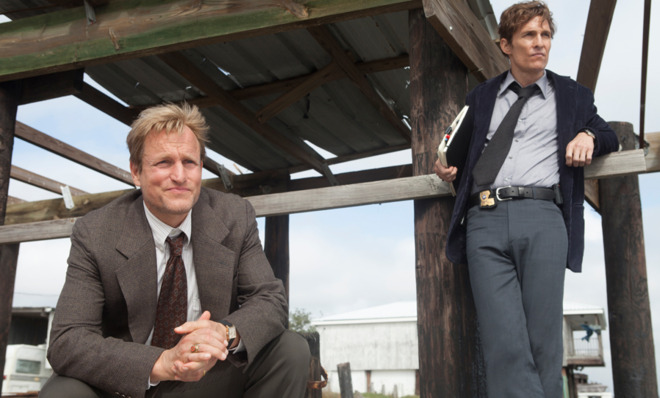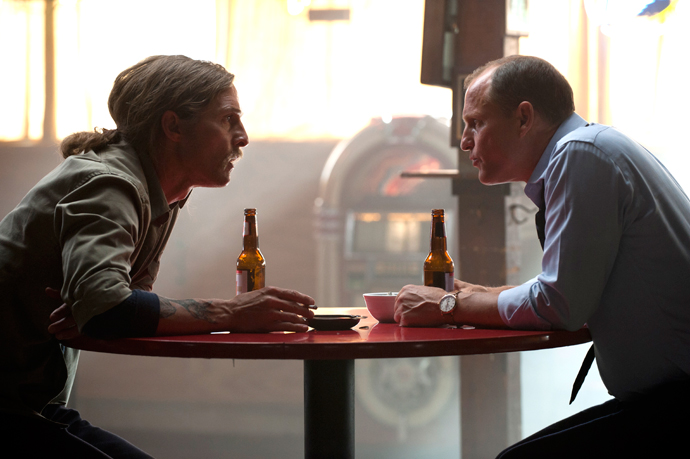The underwhelming, undercooked True Detective finale
What a letdown


A free daily email with the biggest news stories of the day – and the best features from TheWeek.com
You are now subscribed
Your newsletter sign-up was successful
There's a subset of the audience that wouldn't have been satisfied with the True Detective finale unless Cthulu himself had risen out of the Louisiana bayou. Over the past eight weeks, some 10 million viewers have followed protagonists Rust Cohle and Marty Hart into the rabbit hole of the HBO crime drama, and none of us knew how far down we'd go, or how strange the journey might turn out to be.
More than any recent crime drama — and there are many, many other recent crime dramas — True Detective has turned its fans into detectives. This is a show that feels almost reverse-engineered for the Reddit age; its splintered timelines, deliberately repetitive motifs, and winking references to weird fiction icons like Robert Chambers inspired the same kind of obsessive analysis that turned Lost into a hit. (And, of course, there were no shortage of publications who eagerly abetted the show's meteoric rise by trawling Reddit for True Detective theories and compiling them into clickbait posts.) Last night's season finale was one of those rare pockets of "event television" — so eagerly anticipated that the glut of people trying to stream it simultaneously literally shut down HBOGO.
Yes, True Detective's first season is over — but like a lot of TV shows, there was a huge letdown at the end of it.
The Week
Escape your echo chamber. Get the facts behind the news, plus analysis from multiple perspectives.

Sign up for The Week's Free Newsletters
From our morning news briefing to a weekly Good News Newsletter, get the best of The Week delivered directly to your inbox.
From our morning news briefing to a weekly Good News Newsletter, get the best of The Week delivered directly to your inbox.
Early on, it seemed as though True Detective might be offering something more than a pricier, flashier riff on the well-worn crime genre. Rust Cohle's nihilistic perspective on life, the universe, and everything played like a sly commentary on the burden of a Sherlock Holmes-ian knack for deduction; swaggering, questionably competent Marty Hart seemed like a deconstruction of the hard-boiled assholes that generally populate this type of story. But the nuances of the characters in 1995 were gone by the time we caught up with them in the present day. The show's real target wasn't the flawed men of questionable virtue who sat at the center of its story. Instead, True Detective spent its last episode indulging in the creakiest of cop-show cliches: A psychotic backwoods serial killer, complete with a token incestuous love affair.
The intense speculation over True Detective's central mystery has had an unfortunate side effect: Many of the theories devised by fans are far more interesting than the by-the-numbers ending crafted by creator Nic Pizzolatto. There are basic logical questions that don't add up — I guess Errol, the lawnmower man who turned out to be the killer, was such a sloppy worker that he somehow managed to cover both of his own ears in green paint? There are also several unaddressed red herrings that are baffling in retrospect. (Why introduce an entire child-abuse cult if our protagonists are going to spend the last two episodes zeroing in on a single man? And why were there so many screamingly unsubtle hints that Audrey Hart was sexually abused — a plot line that was clearly intended to be something, and never paid off?)

To be fair, True Detective's narrative problems would be less glaring if numerous critics hadn't breathlessly, hyperbolically declared it the greatest show on television. In the end, its successes were more modest: A cleverly constructed, beautifully directed cop show with two stellar performances at its center. That's nothing to turn your nose up at — but at a time when shows like Hannibal and The Americans are doing far more interesting things with both character and genre, it's absolutely insane to put this at the top of the heap.
In the end, both the characters and the show's ambitions were considerably more modest than the truly groundbreaking shows currently airing on television. "We ain't never going to get 'em all," says Marty to Rust near the end of the True Detective finale. "That ain't what kind of world this is." A smarter version of this ending would carry a far darker message about the difficulty of rooting out true evil: When it takes almost 20 years just to catch a backwoods foot solider like Errol Childress, how can we ever expect that people with money and power will be caught?
A free daily email with the biggest news stories of the day – and the best features from TheWeek.com
But if True Detective wants us to be disturbed by that implicit message, it never registers with Marty and Rust, whose narrative ends on an unexpectedly upbeat note — particularly Rust, who uncharacteristically declares that "the light is winning" at the end of episode. Marty gets his family back; Rust achieves a measure of peace about his own dead daughter. The death of Errol, meanwhile, is presented as an unqualified victory, instead of the unsettling coda it should be: Now that Errol is dead, is there anyone who can provide actual, concrete information that will enable police to ferret out the backwoods cult that has been abusing and murdering children for decades?
Rust and Marty seem content to answer that question with a shrug. For all its virtues, True Detective was never really interested in tackling the hard questions: About race, about class, about gender, and about crime. It's an unsatisfying conclusion to a story that still feels undercooked and incomplete — and, thanks to the show's "one case a season" structure, always will. Fortunately, True Detective's unusual narrative conceit also comes with an upside: The second season will be a chance to start over again — and, just maybe, an opportunity to make this the truly groundbreaking, definitive crime drama that the first season hinted it could be.
Scott Meslow is the entertainment editor for TheWeek.com. He has written about film and television at publications including The Atlantic, POLITICO Magazine, and Vulture.
-
 Switzerland could vote to cap its population
Switzerland could vote to cap its populationUnder the Radar Swiss People’s Party proposes referendum on radical anti-immigration measure to limit residents to 10 million
-
 Political cartoons for February 15
Political cartoons for February 15Cartoons Sunday's political cartoons include political ventriloquism, Europe in the middle, and more
-
 The broken water companies failing England and Wales
The broken water companies failing England and WalesExplainer With rising bills, deteriorating river health and a lack of investment, regulators face an uphill battle to stabilise the industry
